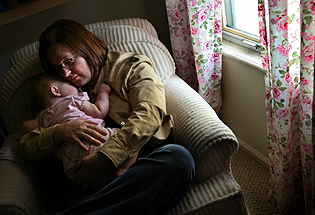UC Berkeley Press Release
Postpartum depression By Shera Dalin SPECIAL TO THE POST-DISPATCH 11/12/2007
Shortly after her daughter Emma was born, Suzanne Meinert broke down into lethargy and crying jags that left her guilt-ridden, drained and hopeless of finding relief. Meinert, 37, a medical technologist at St. John's Mercy Medical Center , also feared that as her baby girl played on the floor, someone would step on her — no matter that they were alone at their home in Ballwin. "It reached the point where I didn't do anything. Going to the grocery store just seemed like an insurmountable task," Meinert said. What she didn't realize was she was suffering from postpartum depression. One in five new moms will suffer from it, and many will refuse treatment because of the stigma or because they don't want their babies to ingest antidepressants in their breast milk. Meinert heard a news report about a new treatment for postpartum depression at Washington University Medical School . The treatment, known as repetitive transcranial magnetic stimulation, is being tested by Dr. Keith Garcia, a psychiatrist and lead investigator of a $200,000 study sponsored by the Barnes-Jewish Foundation. Within a few days after receiving her first treatment in February with the device, Meinert said she began to feel better. After two weeks, her symptoms were gone. "It honestly was incredible. I was shocked to be feeling that well after two weeks," Meinert said. "I was feeling like my old self, and I still feel great today." While Garcia has treated only four women so far with the device, he said Meinert's results are similar to the other women's. The four all had improved mood within the first two weeks or less of treatment and all said they felt like their old selves by the end of the four weeks of treatment. "I'm very optimistic that it will be effective" for even more women, Garcia said. And the women report no depression for three months after treatment, indicating that the one four-week course doesn't need to be repeated, he said. The treatments are painless and administered five days a week over four weeks. They require the patient to sit in a chair for 37 minutes while a magnetic wave is beamed into a specific part of the brain associated with depression. The beam, which is not related to "shock therapy," is emitted in four-second periods from a headpiece that rests on the patient's head. The wave feels like being tapped rapidly and firmly on the head with a pencil. "It's uncomfortable for the first minute or two, and then you get used to it," Meinert said. "For a new mom, it's 30 or 40 minutes where you don't have to do anything. I just closed my eyes and relaxed." Although headaches and seizures are potential side effects of the treatment, Meinert experienced none and neither have the other study participants, Garcia said. "It probably changes the connectivity to the brain," Garcia said. One reason the magnetic stimulation may become so attractive to new moms is that they are able to avoid the side effects of drugs typically used to treat postpartum depression. Side effects of such anti-depressants, which include Paxil and Zoloft, are diarrhea, dry mouth, lethargy, nervousness, a bad taste in the mouth and loss of libido, said study coordinator Patty Flynn, a registered nurse. Antidepressants also take up to four weeks before women begin to feel relief from postpartum depression. Without treatment, the depression can last for a year and gives women a 50 percent chance of developing depression later in life because it damages the brain, she said. Garcia is seeking additional women for the study. Mothers are eligible if they have a baby less than a year old and who are suffering from postpartum depression. Not only is the treatment free but women are paid $240 for their participation, Flynn said. Repetitive transcranial magnetic stimulation has been used to treat drug-resistant depression and schizophrenia in other patients for four years at Washington University . The device, manufactured by Neuronetics Inc. of Malvern , Pa. , is being examined for approval to treat major depression by the U.S. Food and Drug Administration. The approval could come within the next couple of months, Garcia said. While Garcia noted that magnetic stimulation is not a "happy pill," it does offer a nonmedicinal treatment that women haven't had before. Having a baby "is such a spectacular experience," he said. "To be deprived of that is a shame." shera@carismedia.com
Depressao Pós-parto (puerperal)
Pouco tempo após a sua filha Emma nasceu, Suzanne Meinert caiu em letargia e choro, cheia de culpa, sem esperança de encontrar alívio.
|
|
|
|
|

